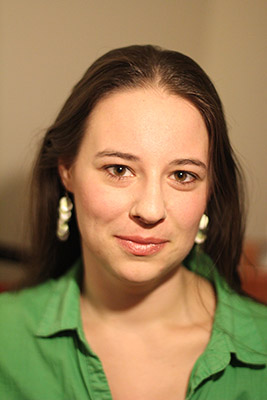Being Visually Impaired in Graduate School

Photo courtesy of Matt Kruger.
Kruger navigates campus with a guide dog named Anchor. Anchor has been with Kruger since he graduated high school, and he dutifully assists Kruger as they travel from building to building and classroom to classroom, taking Kruger directly to his usual seat in all of his classes each day. Kruger reports that NDSU’s campus is relatively easy to maneuver, though things get thrown off a bit for the pair when there’s construction, and the slippery ice build-up in the winter can really slow down their travels across campus.
All the Right Tools
Kruger uses a braille computer and has a note taker to keep him caught up on any notes that he may miss in class. NDSU’s Disability Services has assisted him in getting PDF’s of textbooks so his screen reader, JAWS, can read his books to him, and his instructors have found it easiest to send him any handouts ahead of time to review before class.

Kruger’s professors have been creative in assisting him with adaptations in the classroom. As a soils science student Kruger often works in a lab, and occasionally creative thinking is necessary to be sure he can fully participate in class. “The professor I have right now for soil physics, we’re supposed to be using a modeling program later in the semester and so he met with me over the summer and got an idea of how my screen reader [works]” said Kruger, “… and now he’s been playing around with the modeling program to try to figure out key commands for me to be able to use it.”
In addition to Disability Services, NDSU instructors with any classroom structure needs have access to the university’s instructional design team. The instructional design team is able to work with faculty across a variety of content areas; they are not content experts, but rather experts in pedagogy, teaching strategies, effective uses of technology, and learning styles.
"Universally designed classes are put together with the intention of serving the needs of all students.”
Instructors who use universal design to put their classes together save a lot of time when a student who is visually impaired or a student with any other disability takes their class. Universally designed classes are put together with the intention of serving the needs of all students “to the greatest possible extent, in the most independent and natural manner possible, [and] in the widest possible range of situations.”1

Opening Up
When asked how instructors can best help students like him, Kruger said “being open to doing things a little bit differently; just focusing on the overall goal of what you want the student to learn, but not necessarily how you intended them to learn it.” Kruger takes the time to talk to his instructors before the semester starts to help them prepare for any accommodations that may be needed.
"…focus on the overall goal of what you want the student to learn, but not necessarily how you intended them to learn it.”
Kruger completed his undergraduate degree at St. Cloud State University and found NDSU while looking for graduate programs. He came to campus to visit and found the department environment to be like a family; a feeling that has persisted since he started the program a year ago. “They’ve been really great so far, all the professors I’ve had,” Kruger said.
Kruger’s “can do” attitude has assisted him in becoming the successful student that he is. He isn’t afraid to think outside of the box for ways to approach his learning, and working with his professors on this front demonstrate the success students can find through open communication and collaborative problem solving.
What ways have you worked creatively with students who needed accommodations? Share below.
Resources
- https://nfb.org/resources/blindness-statistics
- https://www.bestcolleges.com/resources/college-planning-with-visual-impairments/
- https://www.washington.edu/doit/universal-design-education-principles-and-applications
- https://cndls.georgetown.edu/universal-design-for-learning/
References
- National Disability Authority of Ireland (n.d.). Retrieved from http://universaldesign.ie/what-is-universal-design/definition-and-overview/definition-and-overview.html
About the author:

Amy Tichy is pursuing her M.Ed. in Clinical Mental Health Counseling at NDSU. She graduated with a Master of Arts in Theatre with a concentration in Drama Therapy from Kansas State University (2014), where she was a Graduate Teaching Assistant, lecturing 6 credits of Public Speaking per semester, and with a Bachelor of Science in History Education and Theatre Education from Dickinson State University (2010). Amy is a licensed teacher and a Registered Drama Therapist. She works in the Office of Teaching and Learning as a Graduate Assistant.